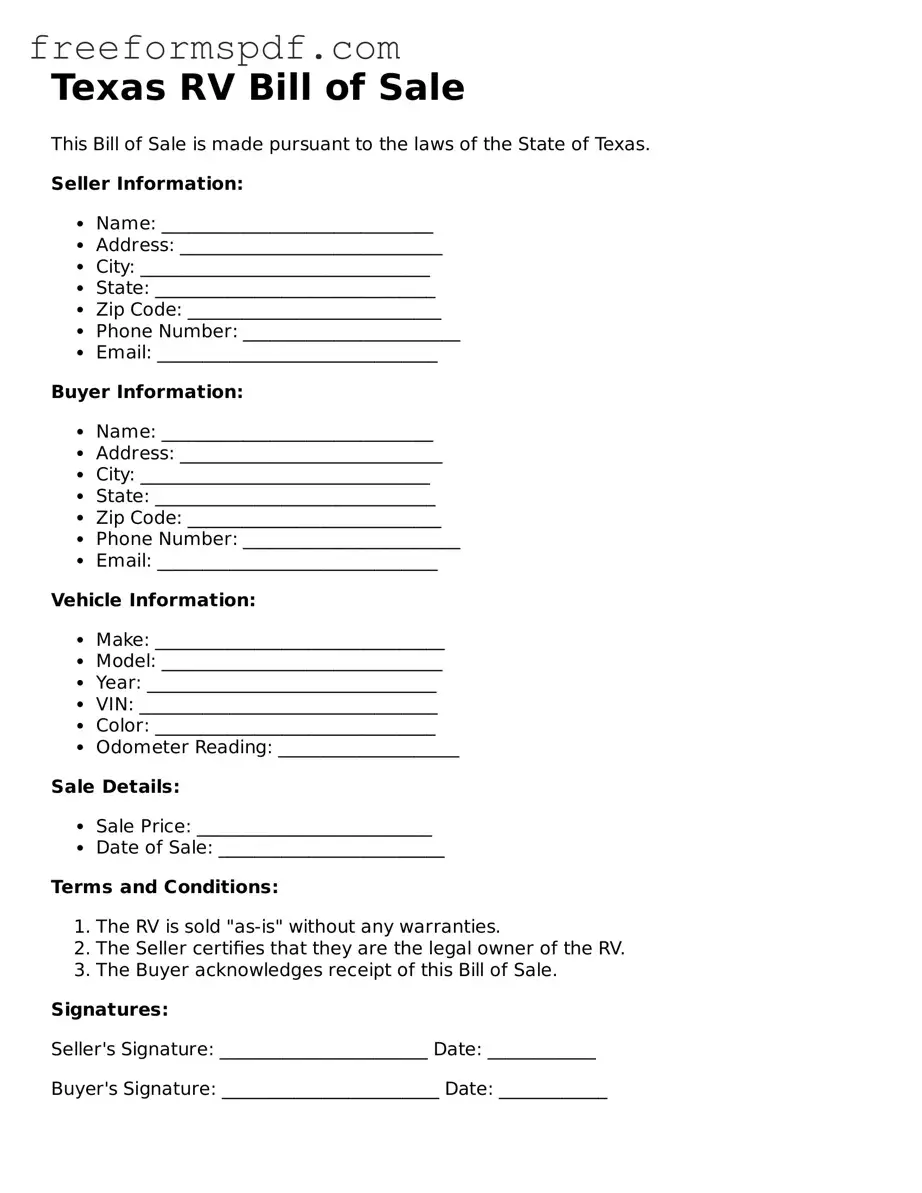Attorney-Verified RV Bill of Sale Document for Texas State
Common mistakes
-
Not including the correct vehicle identification number (VIN). This number is essential for identifying the RV.
-
Failing to provide accurate buyer and seller information. Full names and addresses must be clearly stated.
-
Leaving out the purchase price. This detail is necessary for tax purposes and should be clearly noted.
-
Not signing the form. Both the buyer and seller must sign to validate the sale.
-
Using incorrect dates. Ensure that the date of the sale is filled in correctly.
-
Not indicating whether the RV is sold as-is or with warranties. This can affect future liability.
-
Forgetting to include any additional terms of the sale. Any special agreements should be noted.
-
Not providing a clear description of the RV. Details such as make, model, and year are important.
-
Neglecting to keep a copy of the completed bill of sale. Both parties should retain a copy for their records.
Learn More on This Form
-
What is a Texas RV Bill of Sale?
A Texas RV Bill of Sale is a legal document that serves as proof of the sale and transfer of ownership of a recreational vehicle (RV) in the state of Texas. This document outlines the details of the transaction, including the buyer and seller's information, the RV's description, and the sale price. It is an essential record for both parties, ensuring that the transfer of ownership is clear and legally binding.
-
Why is a Bill of Sale important?
A Bill of Sale is important for several reasons:
- It provides evidence of the transaction, protecting both the buyer and seller in case of future disputes.
- It helps establish the new owner's rights to the RV, which is crucial for registration and titling purposes.
- The document can serve as a record for tax purposes, as sales tax may be applicable based on the sale price.
-
What information is typically included in the Texas RV Bill of Sale?
The Texas RV Bill of Sale generally includes the following information:
- The full names and addresses of both the buyer and seller.
- A detailed description of the RV, including the make, model, year, Vehicle Identification Number (VIN), and any other identifying features.
- The sale price of the RV.
- The date of the transaction.
- Signatures of both parties, indicating their agreement to the terms of the sale.
-
Do I need to have the Bill of Sale notarized?
In Texas, notarization of the Bill of Sale is not required for the document to be valid. However, having it notarized can add an extra layer of security and authenticity to the transaction. It may also be beneficial if you ever need to prove the transaction took place or if there are any disputes in the future.
-
How do I use the Bill of Sale after the purchase?
After the purchase, the Bill of Sale should be kept in a safe place as it serves as proof of ownership. The buyer will need this document when registering the RV with the Texas Department of Motor Vehicles (DMV) and obtaining a title. It is advisable to complete the registration process promptly to avoid any potential issues with ownership or legal liabilities.
Misconceptions
Understanding the Texas RV Bill of Sale form is essential for anyone looking to buy or sell a recreational vehicle in the state. However, several misconceptions can lead to confusion. Here are six common misunderstandings:
- It is not necessary to have a Bill of Sale for an RV transaction. Many people believe that a verbal agreement is sufficient. However, having a written Bill of Sale provides legal protection and serves as proof of the transaction.
- All RV sales require notarization. While notarization can add an extra layer of security, it is not a legal requirement for all RV sales in Texas. A simple signed document is often sufficient.
- The Bill of Sale must be filed with the state. Some assume that the Bill of Sale needs to be submitted to a state agency. In reality, it is primarily for the buyer and seller's records and does not need to be filed.
- Only the seller needs to sign the Bill of Sale. This is incorrect. Both the buyer and seller should sign the document to ensure that both parties agree to the terms of the sale.
- The Bill of Sale includes a warranty for the RV. Many believe that signing a Bill of Sale automatically provides a warranty. In fact, unless explicitly stated, the sale is typically "as-is," meaning the buyer accepts the RV in its current condition.
- There is a specific form required for the Bill of Sale. While there are templates available, Texas law does not mandate a specific format. As long as the document includes essential details about the transaction, it can be valid.
Being aware of these misconceptions can help ensure a smoother buying or selling experience in Texas.
Some Other RV Bill of Sale State Templates
Gifting a Car in Virginia - It can serve as an effective tool for documenting the date of sale, which is important for records.
To foster a productive workplace environment, utilizing the right tools is essential. One such resource is the comprehensive guide to an Employee Handbook template, which provides vital information on company policies and employee expectations.
Where to Sign Title When Selling Car Oregon - This form outlines the details of the transaction between the buyer and seller of an RV.
